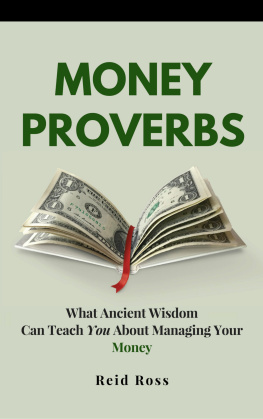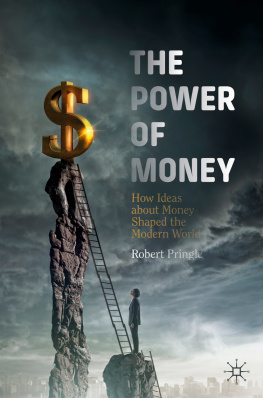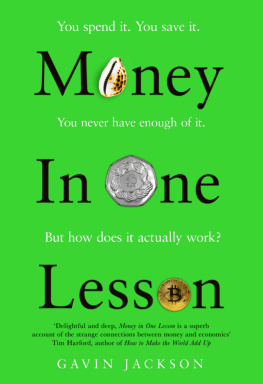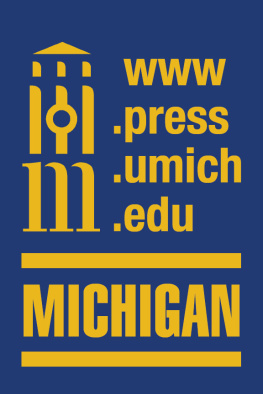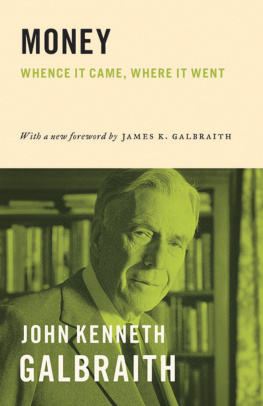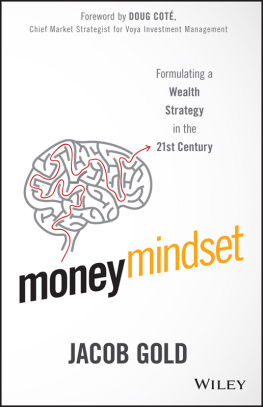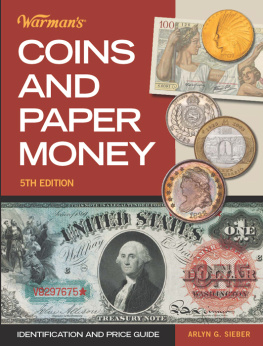
Copyright 2020 by AG Prospect, LLC
Jacket design by Terri Sirma
Jacket illustrations: Cowrie shells Bodor Tivadar / Shutterstock;
Gold, coins, paper money Uncle Leo / Shutterstock; Phone Steven Noble
Cover copyright 2020 by Hachette Book Group, Inc.
Hachette Book Group supports the right to free expression and the value of copyright. The purpose of copyright is to encourage writers and artists to produce the creative works that enrich our culture.
The scanning, uploading, and distribution of this book without permission is a theft of the authors intellectual property. If you would like permission to use material from the book (other than for review purposes), please contact permissions@hbgusa.com. Thank you for your support of the authors rights.
2014 National Public Radio, Inc. Adaption of NPRs Planet Money episode titled Episode 534: The History of Light as originally released on April 25, 2014, and is used with the permission of NPR. Any unauthorized duplication is strictly prohibited.
2015 National Public Radio, Inc. Adaption of NPRs Planet Money episode titled Episode 621: When Luddites Attack as originally released on May 6, 2015, and is used with the permission of NPR. Any unauthorized duplication is strictly prohibited.
Hachette Books
Hachette Book Group
1290 Avenue of the Americas
New York, NY 10104
HachetteBooks.com
Twitter.com/HachetteBooks
Instagram.com/HachetteBooks
First Edition: September 2020
Published by Hachette Books, an imprint of Perseus Books, LLC, a subsidiary of Hachette Book Group, Inc. The Hachette Books name and logo is a trademark of the Hachette Book Group.
The Hachette Speakers Bureau provides a wide range of authors for speaking events.
To find out more, go to www.hachettespeakersbureau.com or call (866) 376-6591.
The publisher is not responsible for websites (or their content) that are not owned by the publisher.
Library of Congress Cataloging-in-Publication Data has been applied for.
ISBNs: 978-0-316-41719-8 (hardcover), 978-0-316-41718-1 (ebook), 978-0-306-92382-1 (intl trade pbk.)
E3-20200807-JV-NF-ORI
To Alexandra, Julia, and Olivia
Money Is Fiction
In the fall of 2008, I went out to dinner with my aunt Janet. She started life as a poet (the 60s) and wound up with an MBA (the 80s), so shes a good person to talk with about money. In the weeks before our dinner, trillions of dollars in wealth had suddenly vanished. I asked her where all that money went.
Money is fiction, she said. It was never there in the first place. That was the moment I realized money is weirder and more interesting than I thought.
I was working as a reporter at the Wall Street Journal at the time, but I covered health care and didnt know much about finance or economics. As the financial world fell apart, I started looking for anything that would explain what was going on. I discovered a podcast called Planet Money. The hosts didnt use dry, news-story language or voice-of-God anchorman tones. They talked like smart, funny people who were figuring out what was going on in the world and telling stories to explain it. I loved the show so much I went to work there.
By the time I got to Planet Money, the acute phase of the financial collapse was over, and we started looking at less urgent but more fundamental subjects. In 2011, we went on the radio show This American Life to ask the question Id been wrestling with since that dinner with my aunt: What is money?
The host, Ira Glass, called it the most stoner question he had ever posed on his show.
Maybe! But if so, its the good kind of stoner question, the kind that still seems interesting in the sober light of morning. I returned to the idea of money again and again, chipping away little pieces, one episode at a time. Each little piece was interesting, but the more I learned, the more I felt like there was a deeper, richer story to tell. So I started working on this book.
Over time, I came to understand what my aunt meant when she said money is fiction. Money feels cold and mathematical and outside the realm of fuzzy human relationships. It isnt. Money is a made-up thing, a shared fiction. Money is fundamentally, unalterably social. The social part of moneythe shared in shared fictionis exactly what makes it money. Otherwise, its just a chunk of metal, or a piece of paper, or, in the case of most money today, just a number stored on a banks computers.
Like fiction, money has changed profoundly over time, and not in a steady or gentle way. When you look back, you see long periods of relative stability, and then suddenly, in some corner of the world, money goes bananas. Some wild genius has a new idea, or the world changes in some fundamental way that demands a new kind of money, or a financial collapse causes the monetary version of an existential crisis. The outcome is a profound change in the basic idea of moneywhat it is, who gets to create it, what its supposed to do.
What counts as money (and what doesnt) is the result of choices we make, and those choices have a profound effect on who gets more stuff and who gets less, who gets to take risks when times are good, and who gets screwed when things go bad. Our choices about money gave us the world we live in now: the world where, when a pandemic hit in the spring of 2020, central banks could create trillions of dollars and euros and yen out of thin air in an effort to fight an economic collapse. In the future well make different choices, and money will change again.
These origin stories of money are the best way I know to understand what money is, and the power it has, and what we fight about when we fight about money. This book is the story of the momentsfull of surprise and delight and brilliance and insanitythat gave us money as we know it today.
The origin of money isnt what we thought it was; the story is more messy and bloody and interesting. Marriage and murder are part of it. So is the invention of writing. Money and markets grow up together, and they make people more free but also, sometimes, more vulnerable.
Around 1860, a French singer named Mademoiselle Zlie went on a world tour with her brother and two other singers. At a stop at a small island in the South Pacific, where most people didnt use money, the singers agreed to sell tickets in exchange for whatever goods the islanders could provide.
The show was a hit. A local chief attended. They sold 816 tickets. Zlie sang five songs from popular operas of the day. In a letter to her aunt, Zlie catalogued her pay for the show: 3 pigs, 23 turkeys, 44 hens, 5000 coconuts, 1200 pineapples, 120 bushels of bananas, 120 pumpkins, 1500 oranges. But the windfall, Zlie wrote, left her with a problem.
What to do with these proceeds?
If she were at the market in Paris, Zlie told her aunt, she could sell everything for 4,000 francs. A nice haul! But here, how to resell this, how to cash in all this? The fact is that it is quite difficult to hope to find money from buyers who themselves have paid in pumpkins and coconuts for the pleasure of listening to us.
I am told that a speculator from a nearby island will arrive tomorrow to make cash offers to me and my comrades. In the meantime, to keep our pigs alive, we feed them the pumpkins while the turkeys and chickens eat the bananas and oranges.
In 1864, Zlies letter was published as a footnote in a French book on the history of money. The British economist William Jevons loved the footnote so much that a decade later he used it to open his own book,


